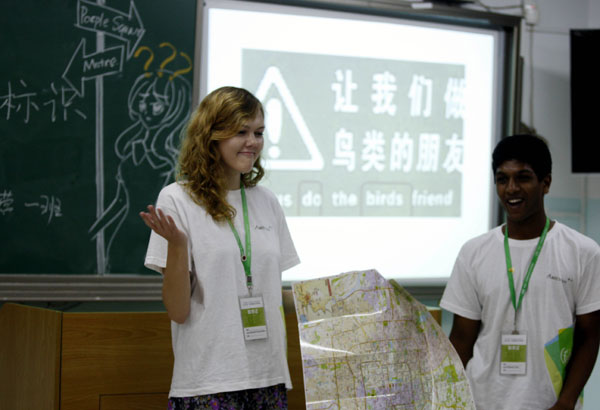Students get hands-on civics lesson
 0 Comment(s)
0 Comment(s) Print
Print E-mail China Daily, July 30, 2012
E-mail China Daily, July 30, 2012
Nearly 300 students from well-known high schools presented their proposals on a model political consultative conference on Friday in Beijing.
The conference was part of the activities at a summer camp named 2012 Ameson Chinese Elite Program, which lasts from July 23 to 30.
The camp attracted 260 students from China's most prestigious high schools, and 22 from the United States.
"Most of these outstanding Chinese students have just learned about our country's political system from textbooks, instead of having any participation in the real political process," said Sean Zhang, a member of China Zhi Gong Party and a well-known education expert. "I believe it will be a great help for them to understand China's political system through the model political consultative conference.
"As for the US students, as far as I know, most of them have the wrong belief that China has only one party, so I think it is necessary to give the future US elites a chance to better understand our political development."
Mary Carmack, 18, from the US, said: "I had never heard of the Chinese People's Political Consultative Conference, though I have heard about the National People's Congress. In the summer camp, a speaker gave us a lecture on how the NPC and CPPCC work, which is very interesting."
The CPPCC serves as a key mechanism for multiparty cooperation and political consultation under the leadership of the Communist Party of China and a major manifestation of socialist democracy.
At present, the CPPCC consists of representatives of the CPC and non-communist parties, and its main functions are to conduct political consultation, exercise democratic supervision and participate in the discussion and the handling of State affairs.
The model political consultation conference was designed after the framework of the CPPCC with students filing proposals after investigating a social problem they are concerned with.
Students were divided into 10 groups, and each group selects a topic the members are most interested in and carries out investigation under the guidance of teachers.
"This is the first time that I have participated in this kind of activity, and I think it is really amazing," said Sun Peigen, 17, from Nantong Middle School in Jiangsu province. Sun's group decided to file a proposal on food safety.
"Although the government had issued enough laws and regulations on food safety, we find shocking food safety incidents constantly and everyone has to worry about the food on their table every day.
"I think the reason is that the responsible departments are passing the buck, so we want to file a proposal to clarify the responsibility of different government bodies," Sun said.
Wang Zhe, 17, from the High School attached to Northeast Normal University in Jilin province, said: "Although all my classmates are busy preparing next year's college entrance exam this summer and I am spending a week here, I think I am learning more than at any time I was at school.
"In the past, I thought that social problems are not the business of high school students like me. But now I have learned that we high school students can form a very strong force and act as participants to make our society better."
Lica Li, chief representative of the China Office of Ameson Education and Culture Exchange Foundation, said: "After their research, I find the students change their minds - they understand the social problem better, they stop blaming, they know the complexity and they start searching for solutions."
The students gave presentations on their proposals from Friday to Sunday, and CPPCC members and education experts will choose one of the 10 proposals, which is likely to be submitted to next year's NPC and CPPCC sessions.







Go to Forum >>0 Comment(s)